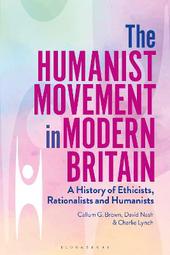
|
The Humanist Movement in Modern Britain: A History of Ethicists, Rationalists and Humanists
Paperback / softback
Main Details
Description
Humanists have been a major force in British life since the turn of the 20th century. Here, leading historians of religious non-belief Callum Brown, David Nash, and Charlie Lynch examine how humanist organisations brought ethical reform and rationalism to the nation as it faced the moral issues of the modern world. This book provides a long overdue account of this dynamic group. Developing through the Ethical Union (1896), the Rationalist Press Association (1899), the British Humanist Association (1963) and Humanists UK (2017), Humanists sought to reduce religious privilege but increase humanitarian compassion and human rights. After pioneering legislation on blasphemy laws, dignity in dying and abortion rights, they went on to help design new laws on gay marriage, and sex and moral education. Internationally, they endeavoured to end war and world hunger. And with Humanist marriages and celebration of life through Humanist funerals, national ritual and culture have recently been transformed. Based on extensive archival and oral-history research, this is the definitive history of Humanists as an ethical force in modern Britain.
Author Biography
Callum G. Brown is Professor of Late Modern European History at the University of Glasgow, UK. He is author of The Death of Christian Britain: Understanding Secularisation 1800-2000 (2nd edition 2009), Religion and the Demographic Revolution (2012) and Becoming Atheist: Humanism and the Secular West (Bloomsbury, 2017). David Nash is Professor of History at Oxford Brookes University, UK. He is one of three Editors of the journal, Cultural and Social History. David Nash is the author of several books, including Christian Ideals in British Society (2013) and Blasphemy in the Christian World (2007). Charlie Lynch is Research Associate at Ulster University, UK. He gained his PhD in 2019 and has published articles on the 1960s sexual revolution.
ReviewsThis important book is highly recommended for providing a clear and scholarly study of the uneven development of Humanism from its Victorian precursors to its maturity as the most influential alternative to religions as the basis for a liberal and morally progressive society in the present age. * Edward Royle, Emeritus Professor in History, University of York Country, United Kingdom *
|